Artichoke tea is a delicious and healthy beverage that has been enjoyed for centuries. With its rich antioxidant content and potential health benefits, more and more people are discovering the benefits of incorporating artichoke tea into their diet. Whether you’re looking to improve digestion, aid in weight loss, or simply enjoy a refreshing drink, artichoke tea is a great option. Yelo’s blog will explore some tasty and easy-to-make artichoke tea recipe, including some popular variations like ginger, lemon, and mint.
What is artichoke tea?
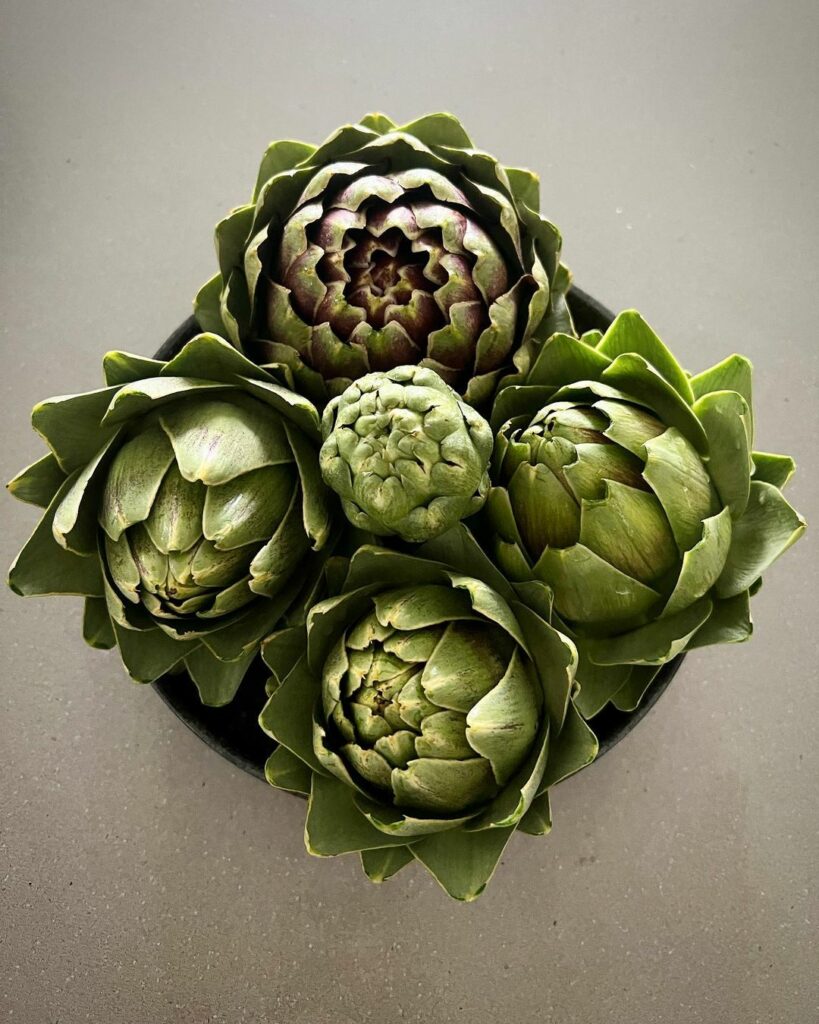
Artichoke tea is a herbal infusion made from the leaves of the artichoke plant. This beverage is believed to have originated in Vietnam, where it’s commonly known as “Vietnamese artichoke tea.”
Artichoke leaf tea has been used in traditional medicine for centuries due to its potential health benefits. Artichoke tea is rich in antioxidants and may help improve digestion, aid in weight loss, reduce cholesterol levels, and improve liver function.
In addition to the traditional Vietnamese recipe, there are many variations of artichoke tea, including ones with ginger, lemon, and mint.
Importance of artichoke tea in traditional medicine
Artichoke tea has been used in traditional medicine for centuries because it its potential health benefits. In some cultures, it’s known as “atiso tea.” Organic artichoke tea, in particular, is popular among those who prefer natural remedies for various health issues.
Artichoke tea is believed to help with digestion, reduce inflammation, and improve liver function. It may also help with weight loss and reduce cholesterol levels. Some studies have even suggested that artichoke tea may have anti-cancer properties. The importance of artichoke tea in traditional medicine cannot be understated, and its potential benefits make it a great addition to any healthy lifestyle.
Is artichoke tea good for you?
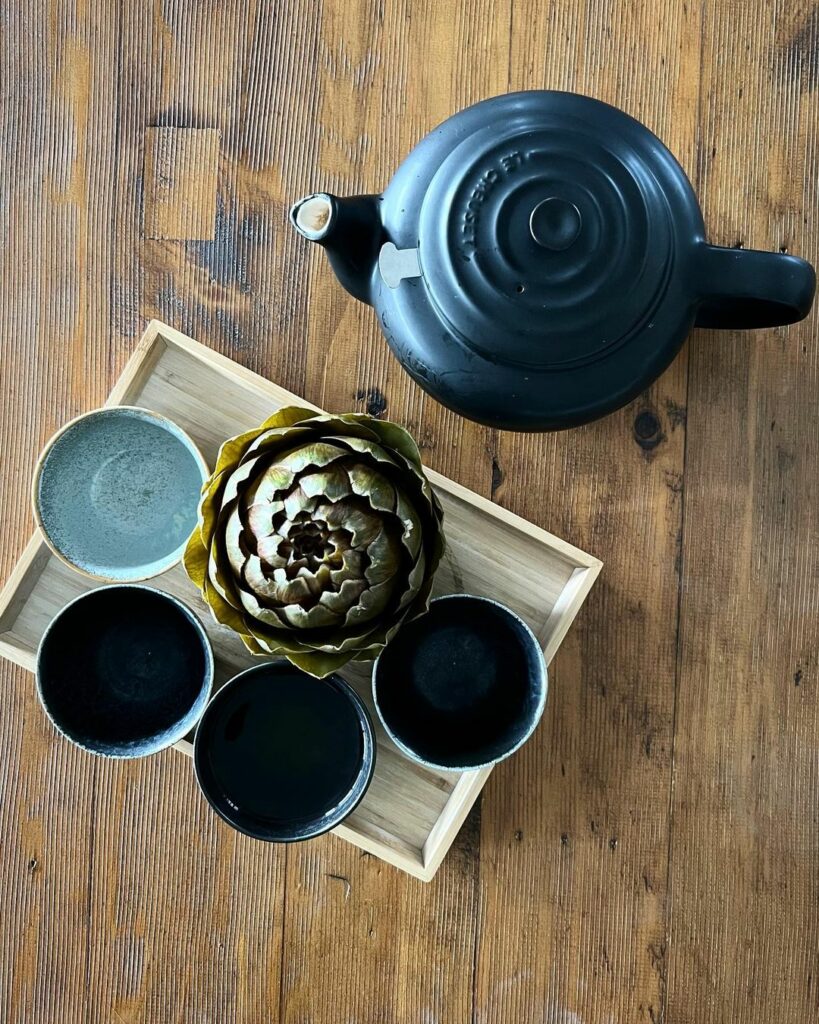
Yes, is artichoke tea good for you, artichoke tea is considered good for you due to its potential health benefits. Here are some of the artichoke tea benefits:
- Rich in antioxidants, which can help prevent damage to cells and reduce the risk of chronic diseases.
- Helps improve digestion by stimulating the production of digestive juices and enzymes.
- Artichoke tea for weight loss may aid in weight loss by reducing appetite and promoting satiety.
- Artichoke tea sleep may improve sleep quality due to its natural sedative properties.
- It may help reduce cholesterol levels by inhibiting the production of cholesterol in the liver.
- Artichoke tea for liver may support liver function by promoting the production of bile, which helps the liver eliminate toxins.
- Artichoke tea for acne may help improve skin health by reducing inflammation and preventing acne.
Artichoke tea is a healthy and refreshing beverage that can be enjoyed for its potential health benefits. However, it’s important to consume it in moderation and consult with a healthcare professional if you have any underlying health conditions or are taking any medications.
When to drink artichoke tea?
Do people always wonder that “can I drink artichoke tea everyday ?” artichoke tea can be consumed at any time of the day. However, some people prefer to drink it before or after meals to help with digestion.
It can also be consumed before bedtime to help improve sleep quality, thanks to its natural sedative properties. If you’re looking to lose weight, drinking artichoke tea before meals may help reduce appetite and promote satiety.
Additionally, if you’re using artichoke tea as a natural remedy for liver or cholesterol issues, you may want to drink it regularly as part of your daily routine. The best time to drink artichoke tea depends on your personal preferences and health goals.
What part of the artichoke is poisonous?
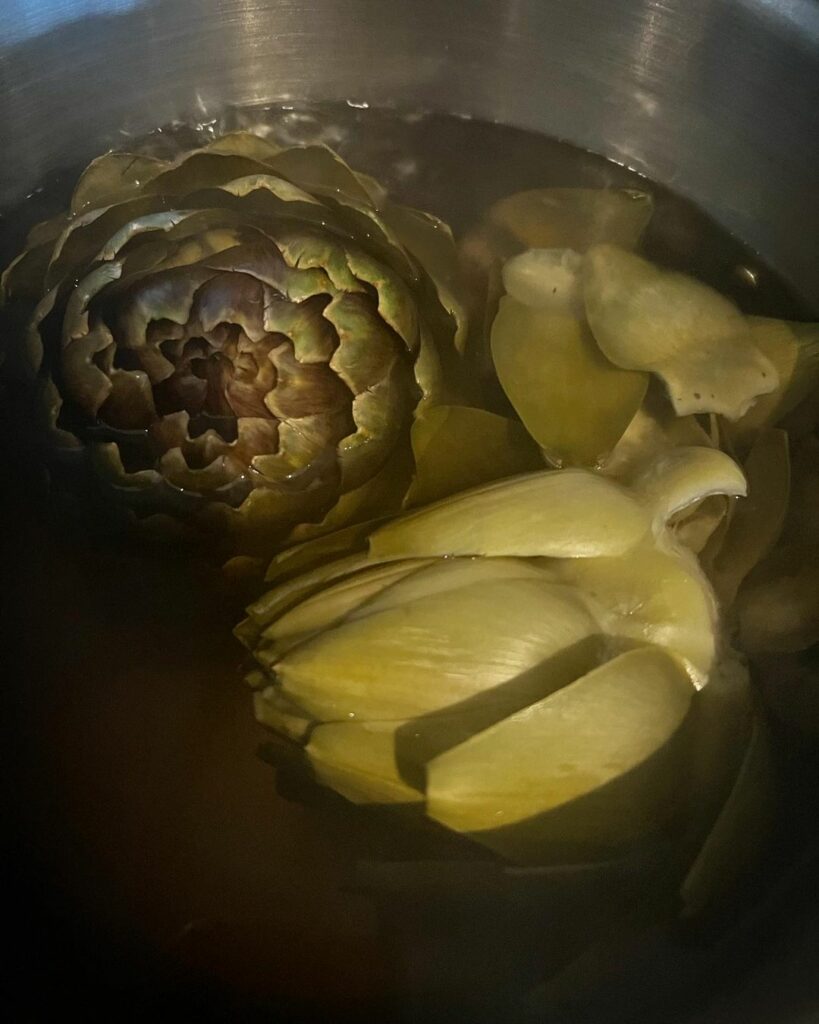
You wonder “what part of the artichoke is poisonous”. While the artichoke plant itself is not poisonous, some parts of the plant can be difficult to digest and may cause discomfort. Besides, tea with artichoke heart is not poisonous and is actually the most commonly consumed part of the artichoke plant. However, the leaves of the artichoke plant do contain a compound called cynarine, which can cause a bitter taste and may be mildly toxic in large amounts.
This is why it’s recommended to use the leaves to make tea only in moderation or use artichoke leaf extract tea made specifically for consumption. So, while the artichoke heart is safe and nutritious to consume, it’s important to be mindful of the leaves and consume them in moderation or in the form of specially made artichoke leaf extract tea.
Additionally, the outer leaves of the artichoke are tough and fibrous, so they are usually trimmed off and not eaten. Overall, as long as the inedible parts of the artichoke are properly removed, it is a safe and healthy vegetable to consume.
What does artichoke tea taste like?
Artichoke tea has a unique and slightly bitter taste, similar to the taste of cooked artichoke leaves. Some people find the taste to be earthy, nutty, or even slightly sweet.
The flavor of artichoke tea can vary depending on the recipe, and it’s often combined with other ingredients like ginger, lemon, or mint to improve the taste. If you’re new to artichoke tea, it’s best to try it plain first to get a sense of its natural taste.
Over time, you may develop a taste for its distinct flavor and even come to appreciate its bitterness. Artichoke herbal tea is a flavorful and healthy beverage that’s worth giving a try.
Artichoke tea recipe
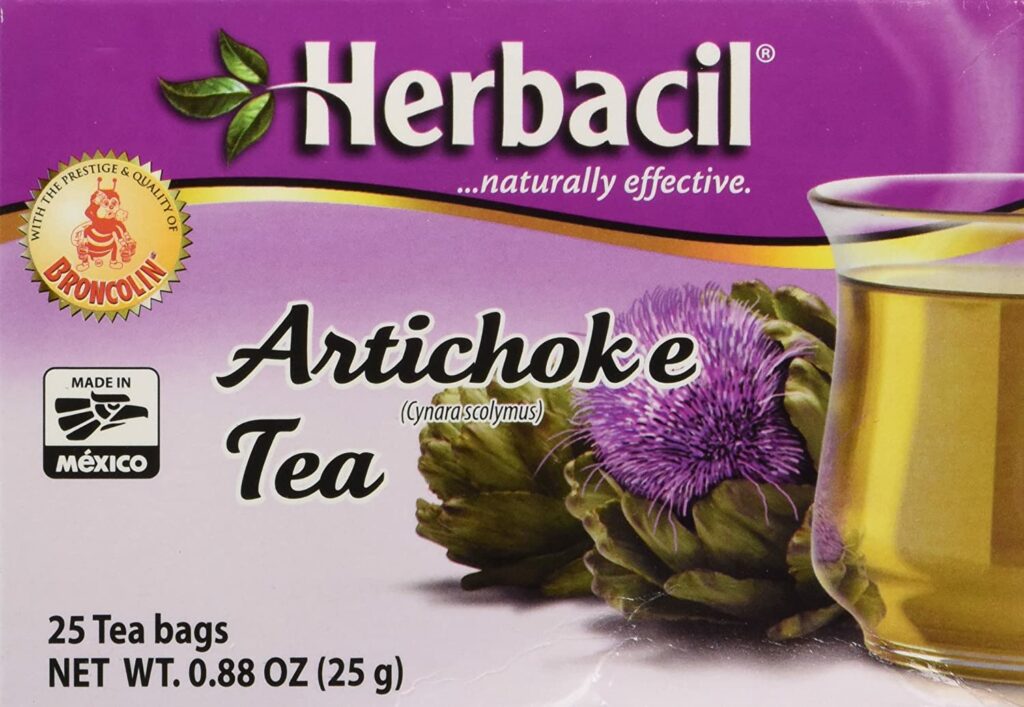
This recipe uses artichoke tea bags, which can be found at most health food stores. Here’s a simple artichoke tea recipe:
Cooking note
- Yield: 1 serving
- Prep time: 5 minutes
- Cook time: 10 minutes
- Total time: 15 minutes
- Course: Beverage
- Cuisine: International
- Equipment:
- Tea kettle or pot
- Tea infuser (optional)
Ingredients
- 1 artichoke leaf extract tea bag
- 8-10 oz of water
- Honey or lemon to taste
How to make artichoke tea?
Here’s a step-by-step guide on how to make artichoke tea:
- If using fresh artichokes, remove the outer leaves and cut off the top quarter of the artichoke.
- Cut the artichoke into quarters and remove the fuzzy choke from the center.
- In a large pot, bring the water to a boil.
- Add the artichoke quarters to the pot and simmer for 20–30 minutes, or until tender.
- Remove the artichokes from the pot and discard them.
- Strain the artichoke water into a teapot or mug, using a fine mesh strainer or cheesecloth to remove any pulp or sediment.
- Add honey or lemon, if desired.
- Serve hot and enjoy your delicious and nutritious cup of artichoke tea!
Note: If using canned artichokes, simply drain the liquid and use it to make tea instead of using fresh artichokes. Alternatively, you can also use artichoke leaf extract tea bags, which can be found at most health food stores. Simply steep the tea bag in hot water for 5–10 minutes, remove the bag, and enjoy.
Table about nutrient facts of artichoke tea
Artichoke tea is virtually calorie-free and contains little to no macronutrients, such as protein, fat, or carbohydrates.
However, it’s rich in antioxidants and may provide various health benefits, as discussed earlier.
Tips for improving the taste
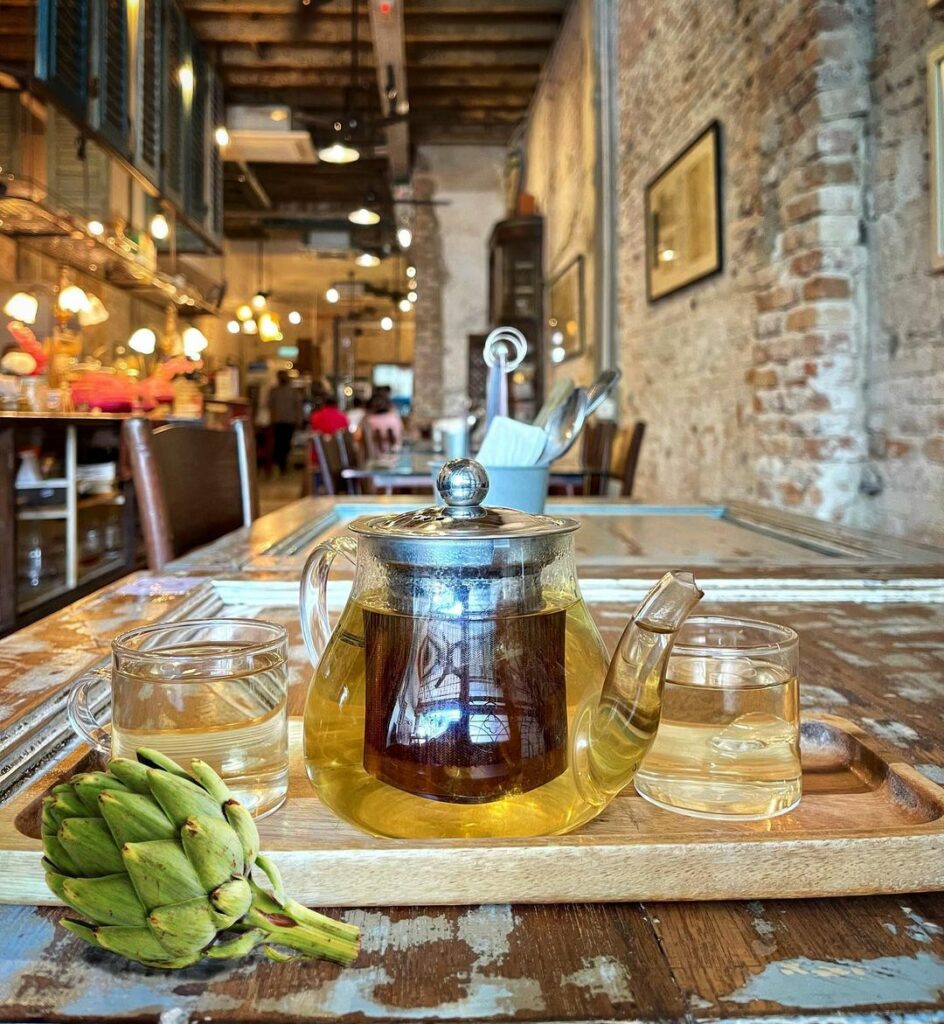
Here are some tips for improving the taste of artichoke tea:
- Add honey or lemon: A touch of honey or a squeeze of lemon can help balance out the bitterness of the artichoke tea and add a hint of sweetness.
- Mix with other flavors: Try combining artichoke tea with other ingredients like ginger, mint, or cinnamon to create a more complex and flavorful beverage.
- Use fresh artichokes: If you’re using fresh artichokes to make tea, choose small, tender artichokes with tight leaves for the best flavor.
- Steep for the right amount of time: Oversleeping can result in a stronger and more bitter taste, so be sure to follow the recommended steeping time.
- Adjust the temperature: Artichoke tea is best brewed with hot water, but the temperature can vary depending on personal preference. Experiment with different water temperatures to find the temperature that suits your taste buds.
- Add milk or cream: For a creamier and milder taste, try adding a splash of milk or cream to your artichoke tea.
With these tips, you can easily improve the taste of your artichoke tea and make it a more enjoyable and delicious beverage.
How to store artichoke tea?
To store artichoke tea, you should follow these steps:
- In an airtight container: Once your artichoke tea has been brewed and cooled, transfer it to an airtight container, such as a mason jar or a tea tin.
- In the fridge: Artichoke tea should be stored in the refrigerator to prevent spoilage and maintain its freshness.
- Consume within 3–4 days: Artichoke tea is best consumed within 3–4 days of brewing to ensure its optimal flavor and nutritional benefits. After this period, the tea may begin to lose its potency and flavor.
- Reheat before drinking: To enjoy your leftover artichoke tea, simply reheat it in a pot or microwave until it reaches your desired temperature.
Variations of artichoke tea
Here are some variations of artichoke tea that you can try:
Artichoke and ginger tea
Add a few slices of fresh ginger to your artichoke tea for a spicy and refreshing twist. Ginger is also known for its potential digestive and anti-inflammatory benefits, making it a great addition to your tea.
Artichoke and lemon tea
Squeeze some fresh lemon juice into your artichoke tea for a bright and citrus flavor. Lemon is rich in vitamin C and can help enhance the antioxidant properties of artichoke tea.
Artichoke and mint tea
Add a few sprigs of fresh mint to your artichoke tea for a cool and refreshing taste. Mint is also known for its potential digestive and calming properties, making it a great addition to your tea.
Dried artichoke tea
If you don’t have access to fresh artichokes, you can also use dried artichoke tea, and leaves to make tea. Simply steep a few teaspoons of dried artichoke leaves in hot water for 5–10 minutes, strain, and enjoy.
With these variations, you can enjoy the potential health benefits of artichoke tea while also exploring different flavor profiles and finding your favorite recipe
How much artichoke tea should you drink?
There is no one-size-fits-all answer to how much artichoke tea you should drink, as it depends on factors such as your age, weight, and overall health. However, in general, it’s recommended to drink 1–2 cups of artichoke tea per day to reap its potential health benefits.
If you’re using artichoke tea as a natural remedy for a specific health condition, it’s best to consult with your healthcare provider first to determine the appropriate dosage and frequency of consumption. Additionally, if you’re pregnant, breastfeeding, or taking any medications, it’s important to talk to your doctor before adding artichoke tea to your diet to ensure its safety and effectiveness.
While artichoke tea is a healthy and nutritious beverage, it’s important to consume it in moderation and follow the recommended dosage guidelines to avoid any potential side effects or interactions with medications.
Famous artichoke tea you should know
There are several best artichoke tea brands of artichoke tea that are popular and highly rated by consumers. Here are some of the best-known artichoke tea brands:
- Jerusalem artichoke tea: Jerusalem artichoke tea is made from the roots of the Jerusalem artichoke plant, this tea is known for its potential health benefits, such as supporting digestive health and reducing inflammation.
- Royal artichoke tea: Royal artichoke tea is made from organic globe artichoke leaves and is known for its potential liver-protective properties and high antioxidant content.
- Ladophar artichoke tea: Ladophar artichoke tea is produced by a Vietnamese company, this tea is made from high-quality artichoke leaves and is known for its natural and refreshing taste.
- Tam Chau artichoke tea: Another Vietnamese brand, Tam Chau artichoke tea is made from organic artichoke leaves and is known for its potential digestive and anti-inflammatory benefits.
- Vinh Tien artichoke tea: Vinh Tien artichoke tea is made from the heart of the globe artichoke plant and is known for its natural sweetness and potential liver-protective properties.
These are just a few examples of popular artichoke tea brands, and there are many more options, and globe artichoke tea is available both online and in health food stores. When selecting an artichoke tea brand, look for high-quality ingredients and consider any potential health benefits or flavor preferences you may have.
Where to buy artichoke tea?
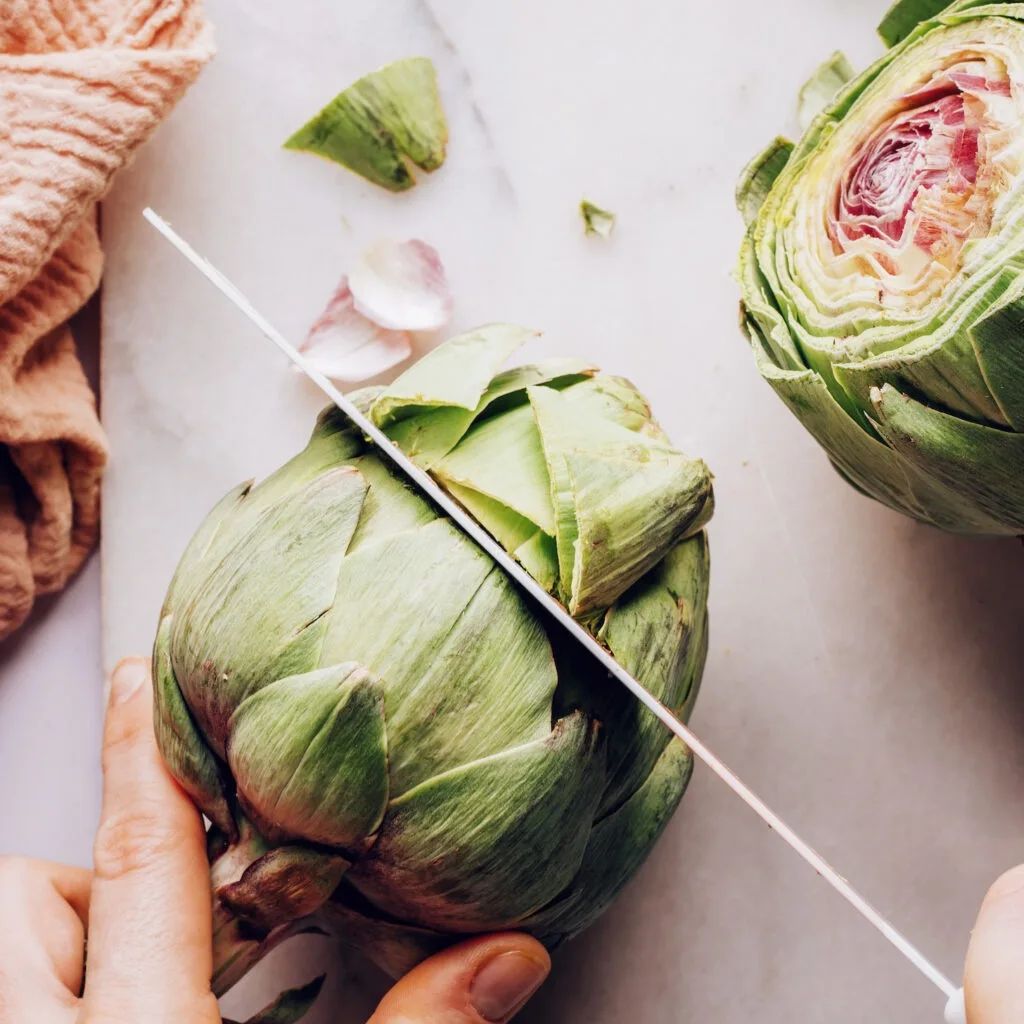
There are several places where to buy artichoke tea, including:
- Online retailers: You can easily find artichoke tea on popular e-commerce sites such as artichoke tea Amazon, where you can choose from a variety of brands and options.
- Health food stores: Many health food stores carry artichoke tea in their tea section, or you may be able to find it in the herbal supplement section.
- Asian grocery stores: Artichoke tea is a popular beverage in Asia, so you may be able to find it in your local Asian grocery store or specialty food market.
- Local tea shops: Some tea shops may carry artichoke tea as part of their selection of herbal teas.
If you’re looking for artichoke tea near you, you can try searching online for “artichoke tea near me” or check the websites of local health food stores or tea shops. Additionally, online retailers such as Amazon offer a wide selection of artichoke tea brands and flavors that can be conveniently delivered to your doorstep.
What are the prices of artichoke tea?
The prices of artichoke tea can vary depending on the brand, quantity, and where you purchase it. Here are some estimated prices to give you an idea:
- Loose-leaf artichoke tea: $5-15 for a 2-3 oz. bag
- Artichoke tea bags: $5-20 for a box of 20-30 tea bags
- Organic artichoke tea: $10-30 for a box of 20-30 tea bags
- Artichoke leaf extract supplements: $15-30 for a 60-90 capsule bottle
The prices can also vary based on the region and the availability of artichoke tea. Some specialty brands or rare variants may be more expensive than others. It’s always a good idea to compare prices between different brands and retailers to ensure you’re getting the best deal.
FAQs
Where does artichoke grow?
Artichokes are native to the Mediterranean region and are primarily grown in countries such as Italy, Spain, and France. However, they are now cultivated in many other parts of the world, including the United States, Mexico, and South America. Artichokes require a mild climate with cool, foggy summers and well-draining soil.
They are typically grown as a perennial crop, with the first harvest occurring in the second or third year after planting. Artichokes are usually grown for their edible flower buds, which are harvested before they fully bloom, but the leaves and stems can also be used for culinary and medicinal purposes.
Why does artichoke water turn green?
When artichokes are cooked or steeped in hot water, they release a compound called chlorogenic acid, which can react with oxygen in the air to produce a green color.
This is why artichoke water can sometimes turn green after it has been steeped or cooked. The intensity of the green color can vary depending on factors such as the freshness of the artichokes, the method of preparation, and the length of time the artichokes are steeped or cooked.
While the green color of artichoke water may not be visually appealing to some, it is a natural occurrence and does not affect the flavor or nutritional value of the tea.
Is artichoke tea safe during pregnancy?
There is limited information available on the safety of consuming artichoke tea during pregnancy, so it is recommended that pregnant women consult with their healthcare provider before adding it to their diet.
While artichoke tea is generally considered safe for most people, it may have potential effects on pregnancy and fetal development due to its high antioxidant content and potential ability to stimulate uterine contractions.
Additionally, some brands of artichoke tea may contain other ingredients or herbs that may not be safe for pregnant women. It’s always important to talk to your healthcare provider before making any dietary changes or adding new supplements to your routine during pregnancy.
Does artichoke tea have caffeine?
No, artichoke tea does not contain caffeine. It is a herbal tea made from the leaves of the artichoke plant, which do not naturally contain caffeine.
This makes artichoke tea a great choice for those who are sensitive to caffeine or looking for a caffeine-free beverage option. Additionally, the lack of caffeine in artichoke tea may make it a good choice for those looking to reduce their overall caffeine intake or avoid it altogether.
Is artichoke tea a diuretic?
Yes, artichoke tea has diuretic properties, which means it can help increase urine production and promote the elimination of excess fluid and waste from the body.
This is due to the presence of compounds such as cynarin and chlorogenic acid in artichoke leaves, which have been shown to have a mild diuretic effect. While artichoke tea can help support kidney function and remove excess water from the body, it’s important to drink it in moderation and not rely on it as a sole treatment for conditions that require medical attention.
Those who are taking diuretic medications or have kidney or urinary tract issues should consult with their healthcare provider before adding artichoke tea to their diet.
Can artichoke tea help with inflammation?
Yes, artichoke tea may have potential anti-inflammatory properties due to its high antioxidant content. Antioxidants help neutralize free radicals in the body, which can cause inflammation and oxidative stress.
Additionally, artichoke leaves contain compounds such as cynarin and luteolin, which have been shown to have potential anti-inflammatory effects in some studies. While more research is needed to fully understand the anti-inflammatory benefits of artichoke tea, incorporating it into a balanced diet and healthy lifestyle may help support overall wellness and potentially reduce inflammation in the body.
Can artichoke tea be used to treat high blood pressure?
Artichoke tea may have potential benefits for those with high blood pressure, but more research is needed to fully understand its effects. Some studies have suggested that artichoke leaf extract, which is a concentrated form of artichoke, may have blood pressure-lowering effects due to its ability to improve blood flow and reduce oxidative stress in the body.
However, there is limited information available on the specific effects of artichoke tea on blood pressure. It’s important to note that while artichoke tea may have potential benefits for those with high blood pressure, it should not be used as a replacement for medical treatment or prescribed medications.
Can artichoke tea be used to reduce stress?
Artichoke tea may have potential benefits for reducing stress due to its high antioxidant content and potential ability to support liver function. Antioxidants help neutralize free radicals in the body, which can cause oxidative stress and potentially contribute to feelings of anxiety and stress.
Artichoke leaves contain compounds such as cynarin and caffeic acid, which have been shown to support liver function and improve detoxification processes in the body. This may help reduce the overall burden of toxins and stress on the body.
Can artichoke tea be used to treat gallstones?
Artichoke tea may have potential benefits for those with gallstones due to its potential ability to support liver and gallbladder function. Artichoke leaves contain compounds such as cynarin and caffeic acid, which have been shown to support liver function and improve bile production and flow. This may help reduce the risk of gallstone formation and potentially improve symptoms in those with existing gallstones.
Additionally, artichoke tea may have potential anti-inflammatory effects, which may help reduce inflammation in the gallbladder and potentially alleviate symptoms. However, it’s important to note that artichoke tea should not be used as a replacement for medical treatment for gallstones or other gallbladder-related conditions.
Does artichoke tea have any side effects?
Artichoke tea is generally considered safe for most people when consumed in moderation as part of a healthy diet. However, like any herbal supplement or beverage, there may be some potential side effects to consider.
Some people may experience mild digestive side effects, such as stomach upset, bloating, or diarrhea, when consuming artichoke tea. Additionally, artichoke leaves contain compounds that may stimulate bile production and flow, which could potentially cause discomfort in those with existing gallbladder or liver conditions.
It’s also possible that some people may be allergic to artichokes and experience an allergic reaction when consuming artichoke tea. If you experience any negative side effects or symptoms after consuming artichoke tea, it’s important to stop using and consult with your healthcare provider.
What are some recipes for cooking with artichoke tea?
Artichoke tea can be a versatile ingredient for cooking and baking. Here are some recipes that incorporate artichoke tea:
- Artichoke Tea Infused Rice: Cook rice according to package directions, but replace half of the water with brewed artichoke tea. This adds a unique flavor and nutrition boost to the rice.
- Artichoke Tea and Lemon Salad Dressing: Brew a cup of artichoke tea and let it cool. Whisk in some lemon juice, honey, olive oil, salt, and pepper for a delicious and healthy salad dressing.
- Artichoke Tea Roasted Chicken: Brew a cup of artichoke tea and let it cool. Use it to marinate chicken breasts for at least an hour before roasting in the oven.
- Artichoke Tea Smoothie: Brew a cup of artichoke tea and let it cool. Blend it with some frozen berries, a banana, some yogurt, and honey for a healthy and refreshing smoothie.
- Artichoke Tea Bread: Brew a cup of artichoke tea and let it cool. Use it in place of water or milk in your favorite bread recipe for a unique and flavorful twist.
By incorporating artichoke tea into your cooking, you can enjoy its potential health benefits while adding flavor and nutrition to your meals.
How does artichoke tea compare to other herbal teas?
Artichoke tea has unique properties and potential health benefits that set it apart from other herbal teas. Here are some comparisons:
- Chamomile tea: Chamomile tea is known for its relaxing properties, while artichoke tea is known for its potential to support liver function and improve digestion.
- Peppermint tea: Peppermint tea is known for its ability to soothe digestive issues, while artichoke tea may have potential benefits for reducing inflammation and improving cholesterol levels.
- Ginger tea: Ginger tea is known for its warming and digestive-friendly properties, while artichoke tea may have potential diuretic properties and support liver function.
- Green tea: Green tea is known for its high antioxidant content and potential benefits for heart health and brain function, while artichoke tea may have potential benefits for digestion and reducing inflammation.
Each herbal tea has its own unique properties and potential benefits, and incorporating a variety of different teas into your diet can provide a range of potential health benefits.
Artichoke tea can be a great addition to a well-rounded herbal tea collection and may offer unique potential benefits for liver function, digestion, and more.
Can artichoke tea be used to treat diabetes?
Artichoke tea may have potential benefits for those with diabetes due to its potential ability to improve insulin sensitivity and support healthy blood sugar levels. Some studies have suggested that artichoke leaf extract, which is a concentrated form of artichoke, may have blood sugar-lowering effects due to its ability to improve insulin sensitivity and reduce inflammation in the body.
Artichoke tea may help support healthy digestion and nutrient absorption, which can also play a role in maintaining healthy blood sugar levels. However, more research is needed to fully understand the potential benefits of artichoke tea for diabetes and its specific effects on blood sugar levels.
If you have diabetes, it’s important to work closely with your healthcare provider to develop a comprehensive treatment plan that may include dietary changes, medication, and other lifestyle modifications.
What are the possible interactions of artichoke tea with medications?
Artichoke tea may have potential interactions with certain medications due to its potential effects on liver function and drug metabolism. Here are some examples:
- Statins: Artichoke tea may interact with statins, a type of medication used to lower cholesterol levels, by potentially increasing the levels of the medication in the body. This can increase the risk of side effects associated with statin use.
- Blood thinners: Artichoke tea may interact with blood thinners, such as warfarin, by potentially increasing the risk of bleeding. This is because artichoke may have blood-thinning effects and may also affect how the body metabolizes the medication.
- Immunosuppressants: Artichoke tea may interact with immunosuppressant medications, such as cyclosporine, by potentially decreasing the effectiveness of the medication. This is because artichoke may affect how the body metabolizes the medication.
If you are taking any medications, it’s important to consult with your healthcare provider before adding any new supplements or making significant changes to your diet.
Conclusion
Finally, artichoke tea is a healthy and flavorful beverage that offers a variety of potential health benefits. With its high antioxidant content and ability to support digestion, reduce cholesterol levels, and improve sleep quality, artichoke tea is a great addition to any diet. Additionally, its versatility in flavor and potential variations make it a popular choice among tea drinkers.
Whether you prefer to buy artichoke tea or make it at home, it’s important to store it properly and consume it in moderation to ensure its maximum benefits. By incorporating artichoke tea into your daily routine, you can enjoy its potential health benefits while also enjoying its natural and refreshing taste.